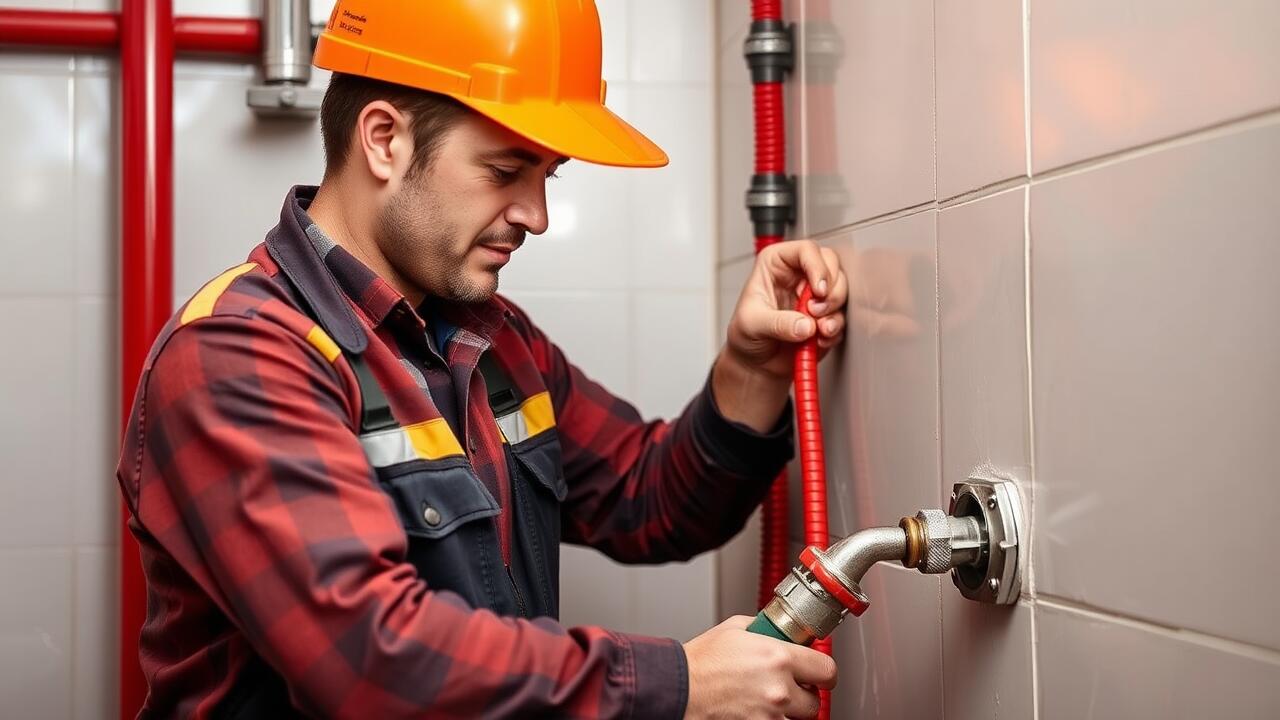
Table Of Contents
Maintenance Tips for Storage Tank Systems
Regular maintenance is essential for extending the lifespan of storage tank hot water systems. Homeowners should check the temperature and pressure relief valves every six months to ensure they are functioning correctly. This step prevents pressure build-up within the tank and reduces the risk of leaks or ruptures. Additionally, sediment can accumulate at the bottom of the tank, which impacts efficiency. Flushing the tank annually helps remove this sediment and improves overall performance.
It is advisable to schedule expert inspections with a qualified hot water plumber regularly. These professionals can identify potential issues that may go unnoticed during routine checks. They can also assess the anode rod, which protects the tank from corrosion. Regular inspections not only enhance the efficiency of the hot water system but can also lead to cost savings through early detection of problems, reducing the need for costly repairs or replacements down the line.
Regular Checks and Upkeep
Regular maintenance of storage tank hot water systems is essential for ensuring optimal performance. Schedule periodic inspections to check for any visible leaks around the tank and its connections. This helps identify potential problems before they escalate. Inspect the temperature and pressure relief valve to ensure it operates correctly. A malfunctioning valve can lead to dangerous pressure build-up, which may compromise the entire system.
In addition to these inspections, flushing the tank annually is vital for preventing sediment buildup. Sediment can reduce heating efficiency and lead to corrosion over time. A licensed hot water plumber can assist with this process, ensuring that the tank is cleaned thoroughly and operating efficiently. Regular service by a professional can extend the lifespan of your system and help maintain the quality of hot water in your home.
Common Issues with Storage Tank Hot Water Systems
Storage tank hot water systems can present various issues that may hinder their efficiency. One common problem is sediment buildup at the bottom of the tank. Over time, minerals and debris can accumulate, leading to reduced heating efficiency and potential damage to the heating element. Homeowners might notice a decrease in water temperature or even unusual noises coming from the tank. Regular cleaning can help maintain the system, but when issues persist, consulting a qualified hot water plumber is essential for professional assessment and intervention.
Another frequent concern is leaks, which can occur due to corrosion, loose fittings, or faulty valves. A leaky tank not only compromises the water supply but can also lead to more extensive damage to the surrounding area. It's crucial to inspect the tank regularly for signs of moisture or water pooling. If leaks are discovered, it’s advisable to contact a hot water plumber immediately. Addressing leaks promptly can prevent further complications and ensure the continued efficiency of the hot water system.
Troubleshooting Tips and Solutions
When facing issues with a storage tank hot water system, it's essential to first identify the symptoms. If the water temperature is inconsistent or there is no hot water at all, examining the thermostat settings is a good starting point. Adjusting the temperature or resetting the thermostat may resolve the problem. If these adjustments don't work, it's advisable to check the circuit breaker or fuses related to the hot water system, as electrical issues can often lead to hot water disruptions.
In cases where there are leaks or unusual noises from the tank, calling in a hot water plumber is recommended. They can assess the situation effectively and offer solutions tailored to the specific problem. It’s also worth noting that sediment build-up can affect efficiency; flushing the tank periodically can help maintain optimal performance. Regular maintenance checks can prevent many common issues from escalating, ensuring the longevity of the storage tank system.
Environmental Impact of Storage Tank Systems
Storage tank hot water systems have notable environmental implications, particularly due to energy consumption and greenhouse gas emissions. These systems typically require electricity or gas to function, which contributes to the overall carbon footprint. The larger the tank, the more energy it generally consumes to maintain water temperature. In turn, this can lead to increased fuel costs and greater environmental degradation if non-renewable energy sources are used. A hot water plumber can assess energy usage and recommend alternatives, such as solar hot water systems, to help mitigate these impacts.
Furthermore, the materials used in storage tanks can affect the environment when they reach the end of their operational life. Many tanks are made from metals that can rust or corrode, leading to potential leaks. This poses a risk not only for water wastage but also for soil and groundwater contamination. Proper disposal and recycling methods should be considered when replacing an old system. Consulting with a hot water plumber can provide insights on sustainable options for installation and disposal, supporting eco-friendly practices within the community.
EcoFriendly Practices to Adopt
Adopting eco-friendly practices in storage tank hot water systems can significantly reduce environmental impact. Insulating the hot water tank and pipes helps minimise heat loss, which can lead to reduced energy consumption. This practice not only lowers utility bills but also conserves energy resources. Regular maintenance checks by a qualified hot water plumber can ensure the system operates efficiently and any leaks or issues are quickly addressed.
Consider installing a timer on the hot water system to limit heating to peak usage times, which is a simple yet effective way to save energy. Opting for a solar hot water system or heat pump can also enhance sustainability. Engaging a professional hot water plumber for advice and installation of such systems ensures adherence to best practices and maximises energy efficiency. These steps contribute not only to individual cost savings but also to a broader commitment to environmental stewardship.
FAQS
What is a storage tank hot water system?
A storage tank hot water system is a type of water heating system that stores a large volume of heated water in an insulated tank for use as needed. These systems can be powered by electricity, gas, or solar energy.
How often should I maintain my storage tank hot water system?
It is recommended to perform maintenance on your storage tank hot water system at least once a year. This includes checking for leaks, inspecting the anode rod, and flushing the tank to remove sediment buildup.
What are some common issues with storage tank hot water systems?
Common issues include insufficient hot water supply, leaking tanks, strange noises, and water discolouration. Regular maintenance can help prevent these problems.
How can I troubleshoot a storage tank hot water system that is not providing hot water?
Start by checking the power supply or gas connection to ensure the heater is functioning. You can also inspect the thermostat settings and ensure the heating element is working properly. If issues persist, it may be best to contact a professional.
Are there eco-friendly practices I can adopt with my storage tank hot water system?
Yes, some eco-friendly practices include setting the thermostat to a lower temperature, insulating the tank and pipes, and using energy-efficient water heaters. Additionally, consider using solar water heating systems to reduce your environmental impact.





























